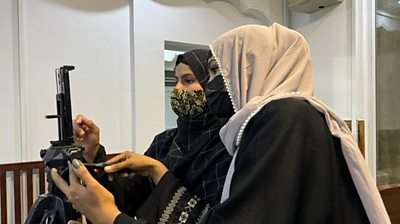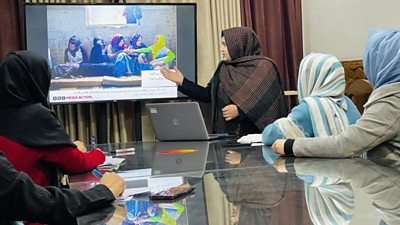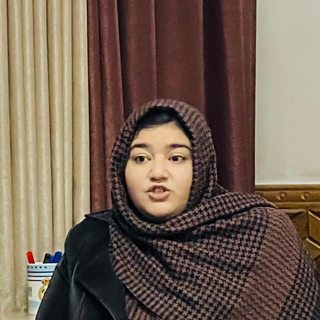I have been working with ����ý Media Action for more than a year – I am a media trainer based in Kabul.
We face uncertainty and increasing restrictions as women in Afghanistan. But I am proud to be working with several remaining women-led, women-focused radio stations, who are serving female audiences with the information they need.
For instance, Nadia and Nasira in Baghdis, a province in the west of Afghanistan, are two of the many radio journalists we are working with in remote areas. They are trying to keep women's voices on air in in their conservative and traditional society under the current restrictions from authorities.
This is just one example of dozens of women journalists who, despite these challenges, are striving to remain on track and work with their colleagues and their sisters.
They produce programmes that they are very important – about education, employment, health, the well-being of women, and especially for girls, many of whom are now deprived of going to school. Lifeline programmes for women can answer their questions and support them to seek medical advice if needed. They can persuade women to see a doctor when they encounter problems, especially during pregnancy or breastfeeding.
We have supported them to produce programmes examining increasing levels of depression and anxiety, especially among girls and women, who are restricted in how and when they can leave their homes. Another topic is around the basic rights of women – including around inheritance and property ownership. We want men and women both to listen to these programmes, so they understand these rights, Our radio partners invite tribal leaders, religious leaders and scholars, and others with influence who can talk about these important topics.
These stories really matter for women who need to help support their families.

In central Afghanistan, one of our partners has a wonderful radio programme in which they cover stories of women with small businesses, such as handicrafts or tailoring. They interview women about their challenges and successes and experts for advice to women who want to do the same.
These stories really matter for women who need to help support their families.
We deliver long-term mentoring to radio stations to ensure they are delivering good quality content for their audiences, and we provide technical training too, to ensure media workers understand how to conduct interviews, how to maintain editorial values, how to engage audiences, and even techniques for recording using mobile phones.
With the advent of new restrictions on women working, we are now advising them on how they can continue their work from home - sending in reports remotely, for example, to ensure their voices and those of their contributors can still be heard. We could see that many stations’ workers don’t know how to use their equipment – such as mixers and microphones - properly, so we are supporting them to learn to broadcast their programmes effectively.
We also share information on how to distinguish facts from false information, and how to stay safe from online bullying and harassment. Our digital safety training is especially important for women in media who might face digital safety threats.
There are great challenges for women like me working in media in Afghanistan, but I am proud that we are able to support these colleagues and our audiences with the information that they need for their everyday lives. One of my favourite programmes by a media partner is called Hope – it is for young people, to help them to share their concerns.
I believe our work is helping our audiences to have hope for the future.

